can与could的用法详解及情态动词有关习题
- 格式:doc
- 大小:87.00 KB
- 文档页数:21

c a n与c o u l d的用法详解及情态动词有关习题Company Document number:WTUT-WT88Y-W8BBGB-BWYTT-19998can与could的用法详解一、表示能力(1)表示现在的能力,用can:My sister can drive. 我妹妹会开车。
Everyone here can speak English. 这儿人人会说英语。
(2)表示将来的能力,通常不用can或could,而用be able to的将来时态:I’ll be able to speak French in another few months. 再过几个月我就会讲法语了。
One day people will be able to go to the moon on holiday. 总有一天人们可以到月球上去度假。
但是,若表示现在决定将来是否有能力做某事,则可用 can:Can you come to the party tomorrow 你明天能来参加我们的聚会吗(3)表示过去的能力,有时可用could,有时不能用could,具体应注意以下几点:①若表示过去一般的能力(即想做某事就随时可做某事的能力),可用could:Could you speak English then 那时候你会说英语吗②若表示过去的特定能力(即在过去特定场合做某事的能力),则不能用could,而用w as (were) able to do sth,或用 managed to do sth,或用 succeeded in doing sth 等。
He studied hard and was able to pass the exam. 他学习很努力,所以考试能及格。
At last he succeeded in solving the problem. 他终于把那个问题解决了。
【注】could 不用来表示过去特定能力通常只限于肯定句,否定句或疑问句中,它则可以表示过去特定的能力:I managed to find the street, but I couldn’t find her house. 我想法找到了那条街,但没找到她的房子。
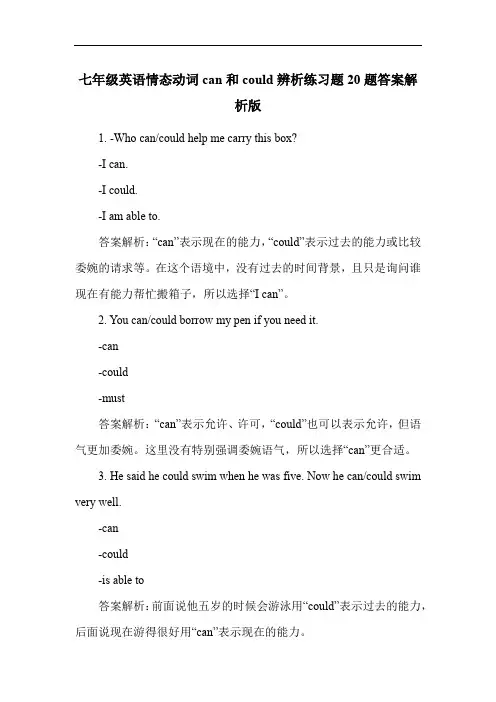
七年级英语情态动词can和could辨析练习题20题答案解析版1. -Who can/could help me carry this box?-I can.-I could.-I am able to.答案解析:“can”表示现在的能力,“could”表示过去的能力或比较委婉的请求等。
在这个语境中,没有过去的时间背景,且只是询问谁现在有能力帮忙搬箱子,所以选择“I can”。
2. You can/could borrow my pen if you need it.-can-could-must答案解析:“can”表示允许、许可,“could”也可以表示允许,但语气更加委婉。
这里没有特别强调委婉语气,所以选择“can”更合适。
3. He said he could swim when he was five. Now he can/could swim very well.-can-could-is able to答案解析:前面说他五岁的时候会游泳用“could”表示过去的能力,后面说现在游得很好用“can”表示现在的能力。
4. Can/Could you please pass me the book?-can-could-may答案解析:“Can/Could you please...”都是表示委婉的请求,这里两个选项都可以,但通常“could”语气更加委婉一些,选择“could”也正确,不过只要求选择一个答案时,“can”也符合要求。
5. She can/could play the piano very well.-can-could-be able to答案解析:这里没有过去的时间背景或委婉语气的要求,所以用“can”表示现在有弹钢琴的能力。
6. I can/could come to your party tomorrow.-can-could-may答案解析:“could”可以表示委婉的可能性,“can”更肯定一些。
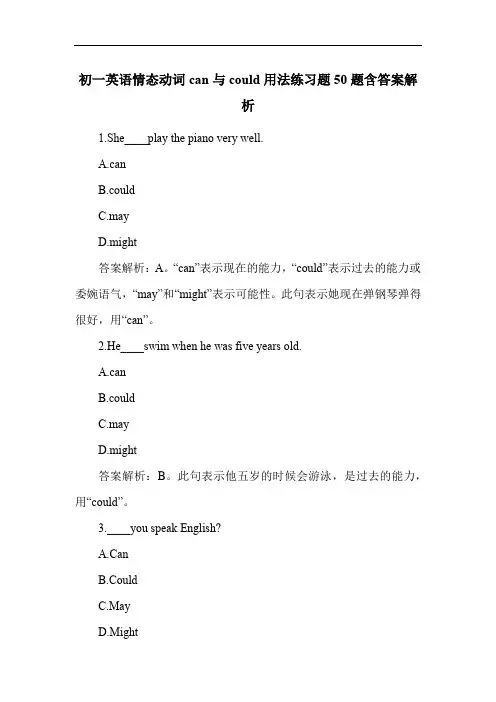
初一英语情态动词can与could用法练习题50题含答案解析1.She____play the piano very well.A.canB.couldC.mayD.might答案解析:A。
“can”表示现在的能力,“could”表示过去的能力或委婉语气,“may”和“might”表示可能性。
此句表示她现在弹钢琴弹得很好,用“can”。
2.He____swim when he was five years old.A.canB.couldC.mayD.might答案解析:B。
此句表示他五岁的时候会游泳,是过去的能力,用“could”。
3.____you speak English?A.CanB.CouldC.MayD.Might答案解析:A。
此句询问现在是否有说英语的能力,用“can”。
4.I____help you with your homework.A.canB.couldC.mayD.might答案解析:A。
表示现在有帮助做家庭作业的能力,用“can”。
5.____she dance beautifully?A.CanB.CouldC.MayD.Might答案解析:A。
询问现在是否有优美跳舞的能力,用“can”。
6.They____play football after school.A.canB.couldC.mayD.might答案解析:A。
表示现在放学后有踢足球的能力,用“can”。
7.____he ride a bike last year?A.CanB.CouldC.MayD.Might答案解析:B。
询问去年是否有骑自行车的能力,是过去的能力,用“could”。
8.We____go to the park on Sunday.A.canB.couldC.mayD.might答案解析:A。
表示在周日有去公园的能力,用“can”。
9.____you sing a song for us?A.CanB.CouldC.MayD.Might答案解析:A。
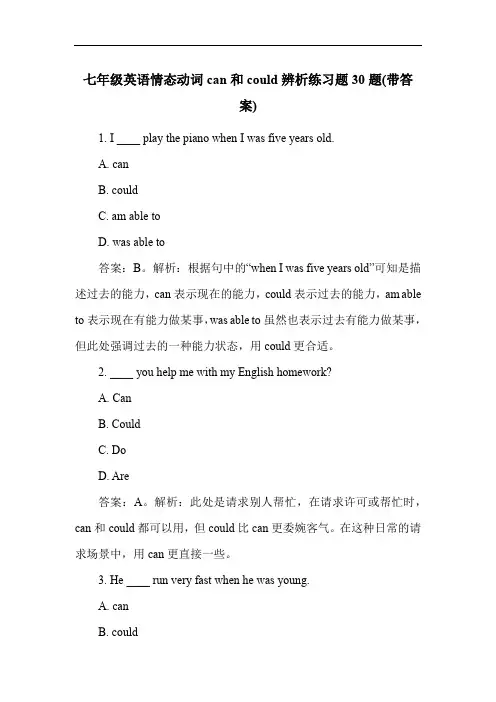
七年级英语情态动词can和could辨析练习题30题(带答案)1. I ____ play the piano when I was five years old.A. canB. couldC. am able toD. was able to答案:B。
解析:根据句中的“when I was five years old”可知是描述过去的能力,can表示现在的能力,could表示过去的能力,am able to表示现在有能力做某事,was able to虽然也表示过去有能力做某事,但此处强调过去的一种能力状态,用could更合适。
2. ____ you help me with my English homework?A. CanB. CouldC. DoD. Are答案:A。
解析:此处是请求别人帮忙,在请求许可或帮忙时,can和could都可以用,但could比can更委婉客气。
在这种日常的请求场景中,用can更直接一些。
3. He ____ run very fast when he was young.A. canB. couldC. shouldD. would答案:B。
解析:句中描述的是他年轻时的能力,是过去的情况,can用于现在,could用于过去,should表示应该,would表示过去常常或意愿,所以选B。
4. ____ I have a glass of water?A. CanB. CouldC. MayD. Must答案:A。
解析:这里是请求许可喝一杯水,can表示许可时比较直接,could虽然也可表示请求许可且更委婉,但在这种比较随意的日常请求场景下,can更合适。
5. She ____ speak three languages now.A. canB. couldC. willD. shall答案:A。
解析:句中说的是她现在能说三种语言,是现在的能力,can表示现在的能力,could表示过去的能力,will表示将来,shall 用于第一人称表示将来或征求意见等,所以选A。
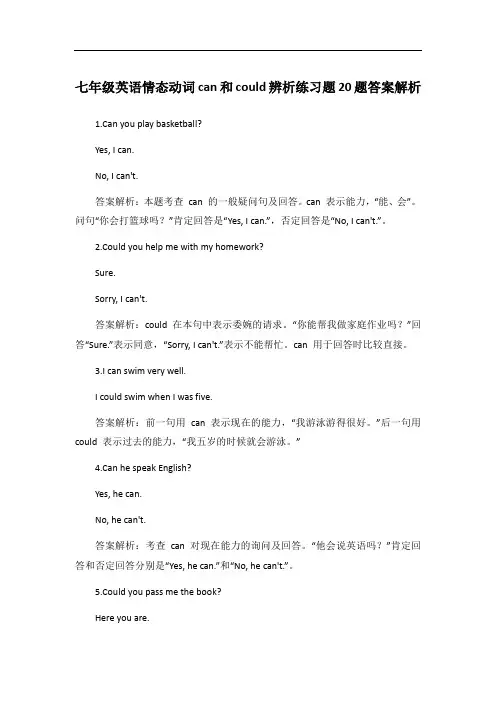
七年级英语情态动词can和could辨析练习题20题答案解析1.Can you play basketball?Yes, I can.No, I can't.答案解析:本题考查can 的一般疑问句及回答。
can 表示能力,“能、会”。
问句“你会打篮球吗?”肯定回答是“Yes, I can.”,否定回答是“No, I can't.”。
2.Could you help me with my homework?Sure.Sorry, I can't.答案解析:could 在本句中表示委婉的请求。
“你能帮我做家庭作业吗?”回答“Sure.”表示同意,“Sorry, I can't.”表示不能帮忙。
can 用于回答时比较直接。
3.I can swim very well.I could swim when I was five.答案解析:前一句用can 表示现在的能力,“我游泳游得很好。
”后一句用could 表示过去的能力,“我五岁的时候就会游泳。
”4.Can he speak English?Yes, he can.No, he can't.答案解析:考查can 对现在能力的询问及回答。
“他会说英语吗?”肯定回答和否定回答分别是“Yes, he can.”和“No, he can't.”。
5.Could you pass me the book?Here you are.Sorry, I can't find it.答案解析:could 表示委婉的请求,“你能把书递给我吗?”回答“Here you are.”表示递给对方书,“Sorry, I can't find it.”表示找不到书不能递给对方。
6.I can draw pictures.I could draw pictures yesterday.答案解析:第一句用can 表示现在的能力,“我会画画。
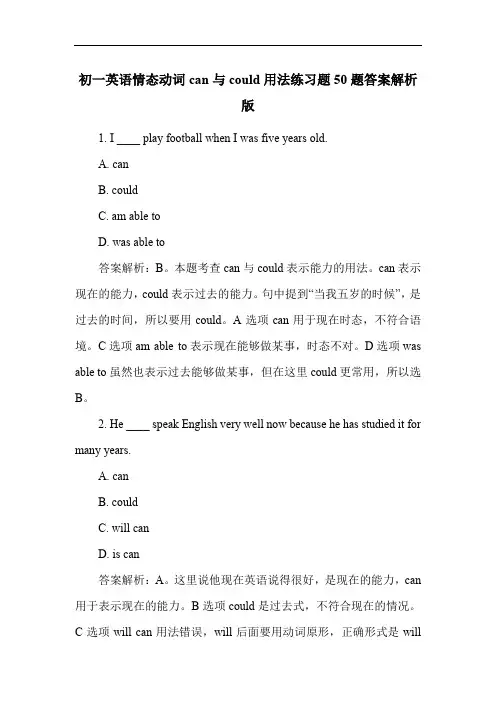
初一英语情态动词can与could用法练习题50题答案解析版1. I ____ play football when I was five years old.A. canB. couldC. am able toD. was able to答案解析:B。
本题考查can与could表示能力的用法。
can表示现在的能力,could表示过去的能力。
句中提到“当我五岁的时候”,是过去的时间,所以要用could。
A选项can用于现在时态,不符合语境。
C选项am able to表示现在能够做某事,时态不对。
D选项was able to虽然也表示过去能够做某事,但在这里could更常用,所以选B。
2. He ____ speak English very well now because he has studied it for many years.A. canB. couldC. will canD. is can答案解析:A。
这里说他现在英语说得很好,是现在的能力,can 用于表示现在的能力。
B选项could是过去式,不符合现在的情况。
C选项will can用法错误,will后面要用动词原形,正确形式是willbe able to。
D选项is can用法错误,所以答案是A。
3. My sister ____ draw pictures when she was a little girl.A. canB. couldC. mayD. must答案解析:B。
句中说“当她是个小女孩的时候”,是过去的时间,描述过去的能力要用could。
A选项can表示现在的能力。
C选项may 表示可能、也许,与能力无关。
D选项must表示必须,也和能力无关,所以选B。
4. - ____ you help me with my math homework? - Yes, I ____.A. Can couldB. Could canC. Can canD. Could could答案解析:C。
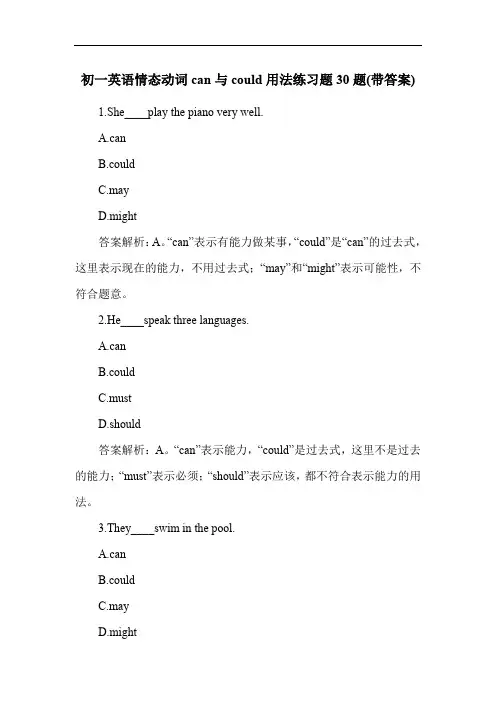
初一英语情态动词can与could用法练习题30题(带答案)1.She____play the piano very well.A.canB.couldC.mayD.might答案解析:A。
“can”表示有能力做某事,“could”是“can”的过去式,这里表示现在的能力,不用过去式;“may”和“might”表示可能性,不符合题意。
2.He____speak three languages.A.canB.couldC.mustD.should答案解析:A。
“can”表示能力,“could”是过去式,这里不是过去的能力;“must”表示必须;“should”表示应该,都不符合表示能力的用法。
3.They____swim in the pool.A.canB.couldC.mayD.might不是过去的能力;“may”和“might”表示可能性,不符合题意。
4.We____draw beautiful pictures.A.canB.couldC.mustD.should答案解析:A。
“can”表示有能力做某事,“could”是过去式,这里不是过去的能力;“must”表示必须;“should”表示应该,都不符合表示能力的用法。
5.I____ride a bike.A.canB.couldC.mayD.might答案解析:A。
“can”表示有能力做某事,“could”是过去式,这里不是过去的能力;“may”和“might”表示可能性,不符合题意。
6.She____sing many songs.A.canB.couldC.mustD.should不是过去的能力;“must”表示必须;“should”表示应该,都不符合表示能力的用法。
7.He____play basketball well.A.canB.couldC.mustD.should答案解析:A。
“can”表示有能力做某事,“could”是过去式,这里不是过去的能力;“must”表示必须;“should”表示应该,都不符合表示能力的用法。
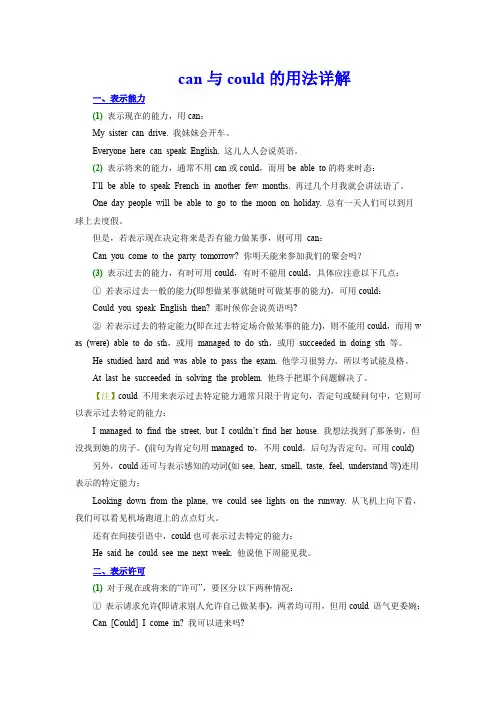
can与could的用法详解一、表示能力(1)表示现在的能力,用can:My sister can drive. 我妹妹会开车。
Everyone here can speak English. 这儿人人会说英语。
(2)表示将来的能力,通常不用can或could,而用be able to的将来时态:I’ll be able to speak French in another few months. 再过几个月我就会讲法语了。
One day people will be able to go to the moon on holiday. 总有一天人们可以到月球上去度假。
但是,若表示现在决定将来是否有能力做某事,则可用can:Can you come to the party tomorrow? 你明天能来参加我们的聚会吗?(3)表示过去的能力,有时可用could,有时不能用could,具体应注意以下几点:①若表示过去一般的能力(即想做某事就随时可做某事的能力),可用could:Could you speak English then? 那时候你会说英语吗?②若表示过去的特定能力(即在过去特定场合做某事的能力),则不能用could,而用w as (were) able to do sth,或用managed to do sth,或用succeeded in doing sth 等。
He studied hard and was able to pass the exam. 他学习很努力,所以考试能及格。
At last he succeeded in solving the problem. 他终于把那个问题解决了。
【注】could 不用来表示过去特定能力通常只限于肯定句,否定句或疑问句中,它则可以表示过去特定的能力:I managed to find the street, but I couldn’t find her house. 我想法找到了那条街,但没找到她的房子。
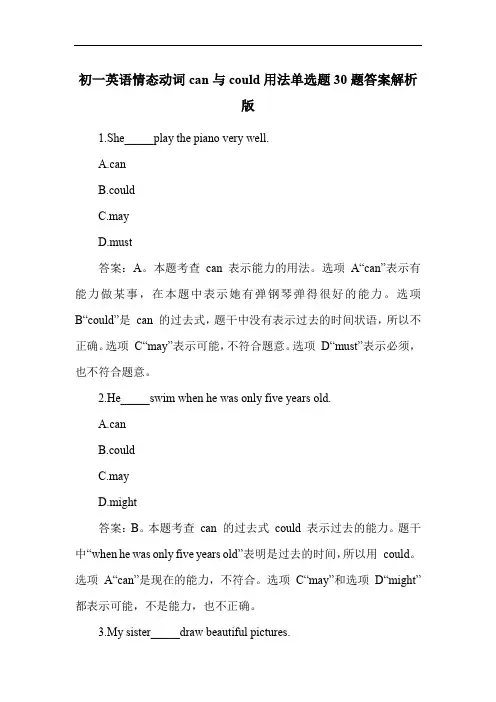
初一英语情态动词can与could用法单选题30题答案解析版1.She_____play the piano very well.A.canB.couldC.mayD.must答案:A。
本题考查can 表示能力的用法。
选项A“can”表示有能力做某事,在本题中表示她有弹钢琴弹得很好的能力。
选项B“could”是can 的过去式,题干中没有表示过去的时间状语,所以不正确。
选项C“may”表示可能,不符合题意。
选项D“must”表示必须,也不符合题意。
2.He_____swim when he was only five years old.A.canB.couldC.mayD.might答案:B。
本题考查can 的过去式could 表示过去的能力。
题干中“when he was only five years old”表明是过去的时间,所以用could。
选项A“can”是现在的能力,不符合。
选项C“may”和选项D“might”都表示可能,不是能力,也不正确。
3.My sister_____draw beautiful pictures.A.canB.couldC.mayD.must答案:A。
本题考查can 表示能力。
选项A“can”表示有能力画漂亮的画。
选项B“could”过去式,题干中没有过去的时间状语。
选项C“may”表示可能,不符合。
选项D“must”表示必须,也不对。
4.The boy_____ride a bike very fast.A.canB.couldC.mayD.should答案:A。
本题考查can 表示能力。
选项A“can”能快速骑自行车,表示能力。
选项B“could”过去式,题干无过去时间。
选项C“may”可能,不符合。
选项D“should”应该,也不合适。
5.I_____speak English and Chinese.A.canB.couldC.mayD.must答案:A。
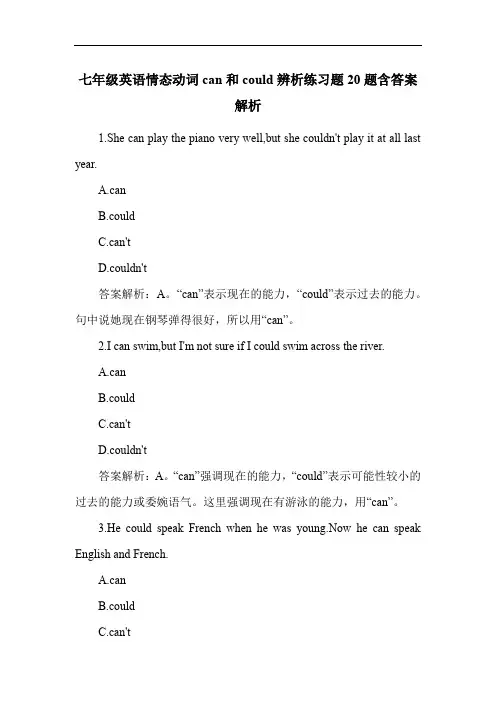
七年级英语情态动词can和could辨析练习题20题含答案解析1.She can play the piano very well,but she couldn't play it at all last year.A.canB.couldC.can'tD.couldn't答案解析:A。
“can”表示现在的能力,“could”表示过去的能力。
句中说她现在钢琴弹得很好,所以用“can”。
2.I can swim,but I'm not sure if I could swim across the river.A.canB.couldC.can'tD.couldn't答案解析:A。
“can”强调现在的能力,“could”表示可能性较小的过去的能力或委婉语气。
这里强调现在有游泳的能力,用“can”。
3.He could speak French when he was young.Now he can speak English and French.A.canB.couldC.can'tD.couldn't答案解析:A。
现在他既会英语又会法语,用“can”表示现在的能力。
“could”是过去的能力。
4.Could you help me with my homework?Yes,I can.A.canB.couldC.can'tD.couldn't答案解析:A。
问句中“Could you...”表示委婉请求,回答用“can”表示现在的能力可以帮忙。
5.She can sing many songs.Could she sing this one?A.canB.couldC.can'tD.couldn't答案解析:A。
前一句说她能唱很多歌,后一句询问她能否唱这一首,根据前一句的能力表述,这里用“can”更合适。
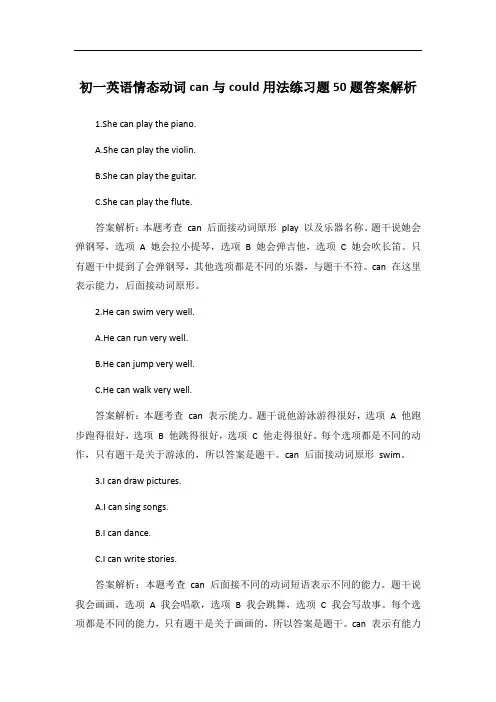
初一英语情态动词can与could用法练习题50题答案解析1.She can play the piano.A.She can play the violin.B.She can play the guitar.C.She can play the flute.答案解析:本题考查can 后面接动词原形play 以及乐器名称。
题干说她会弹钢琴,选项A 她会拉小提琴,选项 B 她会弹吉他,选项 C 她会吹长笛。
只有题干中提到了会弹钢琴,其他选项都是不同的乐器,与题干不符。
can 在这里表示能力,后面接动词原形。
2.He can swim very well.A.He can run very well.B.He can jump very well.C.He can walk very well.答案解析:本题考查can 表示能力。
题干说他游泳游得很好,选项 A 他跑步跑得很好,选项 B 他跳得很好,选项 C 他走得很好。
每个选项都是不同的动作,只有题干是关于游泳的,所以答案是题干。
can 后面接动词原形swim。
3.I can draw pictures.A.I can sing songs.B.I can dance.C.I can write stories.答案解析:本题考查can 后面接不同的动词短语表示不同的能力。
题干说我会画画,选项A 我会唱歌,选项 B 我会跳舞,选项 C 我会写故事。
每个选项都是不同的能力,只有题干是关于画画的,所以答案是题干。
can 表示有能力做某事,后面接动词原形draw。
4.We can play basketball.A.We can play football.B.We can play volleyball.C.We can play tennis.答案解析:本题考查can 后面接不同的球类运动。
题干说我们会打篮球,选项A 我们会踢足球,选项 B 我们会打排球,选项 C 我们会打网球。
七年级英语情态动词can和could辨析练习题20题(带答案)1.She can play the piano well,but she couldn't play it last year.A.can playB.could playC.can't playD.couldn't play答案解析:A。
“can”表示现在的能力,“could”表示过去的能力。
题目中前面说她现在钢琴弹得好,用“can play”;后面说去年不会弹,用“couldn't play”,现在和去年形成对比,强调现在的能力用“can play”。
B 选项“could play”表示过去能弹,不符合现在的情况;C 选项“can't play”表示现在不能弹,与题意不符;D 选项“couldn't play”是过去不能弹,也不符合现在的情况。
2.He can swim in the river.Could he swim there last week?A.can swimB.could swimC.can't swimD.couldn't swim答案解析:B。
前面说他现在能在河里游泳,后面问上周能不能,上周用“could”,“could swim”表示过去的能力。
A 选项“can swim”是现在能游,不是上周的情况;C 选项“can't swim”现在不能游,不符合题意;D 选项“couldn't swim”上周不能游与前面的语境不符。
3.I can speak English.Could I speak it when I was five?A.can speakB.could speakC.can't speakD.couldn't speak答案解析:D。
现在我能说英语,问五岁的时候能不能,五岁是过去,用“couldn't speak”表示过去不能。
初一英语情态动词can与could用法练习题50题(带答案)1.She can play the piano very well.(改为一般疑问句)Can she play the piano very well?答案解析:一般疑问句将can 提前,所以答案是Can she play the piano very well?。
2.He could swim when he was five years old.(改为否定句)He couldn't swim when he was five years old.答案解析:否定句在could 后加not,缩写为couldn't。
3.I can speak English and French.(对划线部分提问)What languages can you speak?答案解析:对English and French 提问用what languages,然后将can 提前,第一人称变为第二人称。
4.Could you help me with my homework?Yes,I can.No,I can't.答案解析:Could you...?表示委婉的请求,肯定回答用Yes,I can.,否定回答用No,I can't.。
5.She can dance very well.(改为否定句)She can't dance very well.答案解析:否定句在can 后加not,缩写为can't。
6.They could ride bikes last year.(改为一般疑问句)Could they ride bikes last year?答案解析:一般疑问句将could 提前。
7.Can you sing a song for us?Yes,I can.No,I can't.答案解析:Can you...?表示请求,肯定回答用Yes,I can.,否定回答用No,I can't.。
七年级英语情态动词can和could辨析练习题30题1.She____play the piano very well when she was young.A.canB.couldC.mayD.might答案:B。
could 表示过去的能力,句子中“when she was young”表明是过去的时间,所以用could。
can 表示现在的能力,may 和might 表示可能性,不符合题意。
2.____you swim now?A.CanB.CouldC.MayD.Might答案:A。
now 表明是现在的时间,用can 表示现在的能力。
could 表示过去的能力,may 和might 表示可能性,不符合题意。
3.My brother____ride a bike when he was five.A.canB.couldC.mayD.might答案:B。
“when he was five”表明是过去的时间,用could 表示过去的能力。
can 表示现在的能力,may 和might 表示可能性,不符合题意。
4.____I help you with your homework?A.CanB.CouldC.MayD.Might答案:A。
表示现在询问是否有能力帮助对方做作业,用can。
could 表示过去的能力,may 和might 表示可能性,不符合题意。
5.She said she____speak three languages.A.canB.couldC.mayD.might答案:B。
“said”表明是过去的事情,用could 表示过去有说三种语言的能力。
can 表示现在的能力,may 和might 表示可能性,不符合题意。
6.____you play basketball after school?A.CanB.CouldC.MayD.Might答案:A。
询问现在放学后是否有能力打篮球,用can。
七年级英语情态动词can和could辨析练习题20题(答案解析)1. She ____ play the piano very well when she was young.A.canB.couldC.mayD.might答案解析:B。
“could”表示过去的能力,“can”表示现在的能力,此句是过去时态,所以选“could”。
“may”和“might”表示可能,不符合题意。
2. —____ I borrow your pen?—Sure. Here you are.A.CanB.CouldC.MustD.Should答案解析:A 或B。
“Can I”和“Could I”都可以用于请求许可,语气上“Could I”更委婉,此两种答案均可。
“Must”表示必须,“Should”表示应该,均不符合请求许可的语境。
3. He ____ swim across the river. It's too wide.A.canB.couldD.couldn't答案解析:D。
根据后句“河太宽了”可知他不能游过河,且此处表示现在的能力,否定形式应为“can't”或“couldn't”,根据语境选择“couldn't”更符合。
“can”和“could”表示肯定的能力,不符合语境。
4. —____ you help me with my homework?—Yes, I can.A.CanB.CouldC.MayD.Might答案解析:A。
回答是“I can”,所以问句用“Can”。
“Could”“May”“Might”回答形式不同,不符合。
5. I ____ speak English, but I ____ speak French.A.can, can'tB.could, couldn'tC.can't, canD.couldn't, could答案解析:A。
初一英语情态动词can与could用法练习题50题(答案解析)1. I ____ play basketball very well.A. canB. mayC. mustD. should答案解析:A。
本题考查can表示能力的用法。
句意为我篮球打得很好,这里强调的是一种能力,can表示某人具有做某事的能力。
选项B“may”表示可能、也许,通常用于表示许可或可能性的推测;选项C“must”表示必须,强调必要性;选项D“should”表示应该,表达一种建议或责任,均不符合句子表达能力的语境。
2. He ____ speak English and French.A. canB. needC. wouldD. might答案解析:A。
此句说他会说英语和法语,这里是指他具备说这两种语言的能力,所以用can。
选项B“need”表示需要;选项C“would”常用于过去将来时或表示委婉的请求等;选项D“mighty”表示可能、也许,通常表示不太确定的推测,都不能表示能力,所以不选。
3. My sister ____ draw beautiful pictures when she was five.A. canB. couldC. shouldD. must答案解析:B。
根据句中的“when she was five”可知是过去的情况,can的过去式是could,表示过去的能力,句意为我妹妹五岁的时候就能画漂亮的画了。
选项A“can”是一般现在时;选项C“should”表示应该;选项D“must”表示必须,都不符合句子表达过去能力的语境。
4. - ____ you run fast? - Yes, I ____.A. Can, canB. May, mayC. Must, mustD. Should, should答案解析:A。
问句是在询问对方是否有快跑的能力,用Can提问;答句根据Yes可知是肯定回答,也要用can。
七年级英语情态动词can和could辨析练习题20题带答案1. I ____ play the piano when I was five years old.A. canB. couldC. am able toD. was able to答案:B。
解析:本题考查can和could表示能力的用法。
句中提到“when I was five years old”是过去的时间,can表示现在的能力,could表示过去的能力,这里描述过去五岁时能弹钢琴的能力,所以用could。
A选项can用于现在时态,不符合句子时态;C选项am able to是一般现在时的表达,也不符合句子时态;D 选项was able to虽然也表示过去有能力做某事,但相比之下,could更简洁地表达过去的能力,所以本题选B。
2. ____ you help me with my English homework?A. CanB. CouldC. AreD. Do答案:A。
解析:本题考查can和could用于请求的用法。
在表示请求时,can通常用于比较熟悉的人之间,比较直接;could用于更礼貌、更委婉的请求,通常用于不太熟悉的人或者正式场合。
这里没有体现出特别需要委婉的语境,用can更合适。
B选项could虽然也可用于请求,但在这种日常的同学之间的请求场景下,can更常用;C选项Are和D选项Do都不能表示请求帮助的意思,所以本题选A。
3. She ____ draw very well now after taking art classes.A. canB. couldC. will canD. shall can答案:A。
解析:本题考查can表示现在的能力。
句中“now”表明是现在的情况,can表示现在能够做某事,could表示过去的能力,C和D选项“will can”和“shall can”是错误的表达形式,不存在这种用法。
can与could的用法详解一、表示能力(1)表示现在的能力,用can:My sister can drive. 我妹妹会开车。
Everyone here can speak English. 这儿人人会说英语。
(2)表示将来的能力,通常不用can或could,而用be able to的将来时态:I’ll be able to speak French in another few months. 再过几个月我就会讲法语了。
—One day people will be able to go to the moon on holiday. 总有一天人们可以到月球上去度假。
但是,若表示现在决定将来是否有能力做某事,则可用 can:Can you come to the party tomorrow 你明天能来参加我们的聚会吗(3)表示过去的能力,有时可用could,有时不能用could,具体应注意以下几点:① 若表示过去一般的能力(即想做某事就随时可做某事的能力),可用could:Could you speak English then 那时候你会说英语吗② 若表示过去的特定能力(即在过去特定场合做某事的能力),则不能用could,而用w as (were) able to do sth,或用 managed to do sth,或用 succeeded in doing sth 等。
He studied hard and was able to pass the exam. 他学习很努力,所以考试能及格。
~At last he succeeded in solving the problem. 他终于把那个问题解决了。
【注】could 不用来表示过去特定能力通常只限于肯定句,否定句或疑问句中,它则可以表示过去特定的能力:I managed to find the street, but I couldn’t find her house. 我想法找到了那条街,但没找到她的房子。
(前句为肯定句用managed to,不用could,后句为否定句,可用could)另外,could还可与表示感知的动词(如see, hear, smell, taste, feel, understan d等)连用表示的特定能力:Looking down from the plane, we could see lights on the runway. 从飞机上向下看,我们可以看见机场跑道上的点点灯火。
还有在间接引语中,could也可表示过去特定的能力:He said he could see me next week. 他说他下周能见我。
二、表示许可((1)对于现在或将来的“许可”,要区分以下两种情况:① 表示请求允许(即请求别人允许自己做某事),两者均可用,但用could 语气更委婉:Can [Could] I come in 我可以进来吗【注】此时也可用may或might,其中might和could均不表过去,只表委婉语气。
② 表示给予允许(即自己允许别人做某事), 一般只用 can,而不用 could:“Could [Can] I use your pen ” “Yes, of course you can.” “我可以借用你的钢笔吗”“当然可以。
”(不能说Yes, you could.)(2)对于过去的“许可”,也要区分以下两种情况:① 表示过去一般性允许(即表示某人随时都可以做某事),用can的过去式could:|When I lived at home, I could watch TV whenever I wanted to. 我住在家里时, 想什么时候看电影就可以什么时候看。
(一般性允许)② 表示过去特定的允许(即表示在过去某一特定情况下允许进行某一特定的活动),则不用 could,而需换成其他表达(如had permission, was [were] allowed to):I was allowed to see the film yesterday evening. 昨天晚上允许我去看了电影。
(特定的允许,不能用 could)三、表示推测(1)对现在或将来的推测,两者均可用,但can 通常只用于否定句或疑问句中,一般不用于肯定句,而could则可用于肯定句、否定句和疑问句:It can’t be true. 那不可能是真的。
What can they be doing 他们会在干什么呢&We could go there this summer. 今年夏天我们可能要去那儿。
(将来可能性)You could be right, but I don’t think you are. 你可能是对的,但我并不认为你是对的。
(现在可能性)【注】can 有时也用于肯定句中表示推测,这主要见于:① 表示理论上的可能性(即从理论上看是可能的,但实际未必会发生):Even experienced teachers can make mistakes. 即使是有经验的教师也可能出错。
② 用于含有only等表示限制的肯定句:(from is that at the door ” “It can only be the postman.”“门外是谁”“只能是邮递员。
”③ 后接“be (get, seem, become)+形容词”,表示“有时会”、“时常会”等:It can get very hot here. 这里有时会很热。
—She can be very unpleasant. 她有时很令人讨厌。
(2)对过去的推测,必须在 can, could 之后接动词的完成式。
但此时can仍只用于否定句或疑问句,不用于肯定句;而could则可用于各种句型:He can’t [couldn’t] have seen her there. 他不可能在那儿见到她。
He could have gone home. 他可能已回家了。
Who could have taken it 是谁把它拿走了呢I do not see how I could have done otherwise. 我看不出那时我还能有别的做法。
She could not have been more than sixteen. 那时她不可能超过十六岁。
I couldn’t have won, so I didn’t go in for the race. 我不可能获胜,因此我没参赛。
¥【注】could后接动词的完成式,除表示对过去的推测外,还有以下用法(不用can):① 表示过去没有实现的可能性(即某事本来可以发生,却没发生):He could have told her, but he didn’t choose to. 他本来可以告诉她的,但他却没有。
I could have lent you the money. Why didn’t you ask me 我本来可以借这笔钱给你的。
你为什么不问我② 用来委婉地责备某人过去应该做某事而没有去做:You could have been a little more considerate. 你本可考虑得更周到些的。
You could ask me before you use my phone. 你打电话之前可以问我一声。
You could have helped me why did you just sit and watch 你本可帮助我的,为什么只坐在一旁瞧着—③ 表示“差点儿就要”:I could have died laughing. 我差点笑死了。
I was so angry I could have killed him. 我是那样生气,差点把他杀了。
She felt miserable. She could have cried. 她感到很痛苦,她差点哭了。
may与might用法详解一、表示允许(1)表示请求允许(即请求别人允许自己做某事),两者都可用,只是 might 表示的语气较委婉(但并不表示过去):#May I come round in the morning 我早上来可以吗Might I have a little brandy 我可以喝点白兰地吗I asked her if I might call and see her. 我问她我可否来看她。
I’d like to ask a question if I may. 如果可以的话,我想提个问题。
(2)表示给予允许(即自己允许别人做某事),通常要用 may而不用might:You may leave whenever you please. 你高兴随时可以走。
You may go or stay, according as you decide. 是去是留由你自己决定。
You may use the room so long as you keep it clean. 你可以使用这个房间,只要你能保持干净。
@体会以下对话的问句与答句:A:May [Might] I stay 我可以留下吗 (表请求,可用两者)B:Yes, you may. 可以。
(表允许,不能用 might)【注】在通常情况下,may 表示允许(请求允许或给予允许)时,总是针对“现在”或“将来”而言,若要表示已经给予或已经存在的允许,则通常不用 may,而用can:Nowadays, children can do what they like. 现在小孩子喜欢干什么就可以干什么。
It’s unfair. He can stay and I have to leave. 这不公平,他可以留下,而我却得离开。
例外的情况是,might用于间接引语和 may 用于否定句表示禁止:He said that I might borrow his car. 他说我可以用他的车。
-Visitors may not (=must not) feed the animals. 参观者不得给动物喂食。
二、表示推测两者都可用,只是 might 比 may 语气更不确定,表示的可能性更小。
(1)在句型使用方面:两者均可用于肯定句和否定句,但用于疑问句时,may通常不用于句首,但可用于疑问句的句中(如特殊疑问句等),而might尽管可以用于疑问句的句首,但不算普通,通常会改用其他句式(如用could等):He may [might] know the answer. 他可能知道答案。
And who may [might] she be 那么她会哪一位呢Do you think he may [might] not be able to pay 你认为他可能会付不起钱吗【Might it be true 那会是真的吗【注】在很正式的文体中,may 可用于否定疑问句的句首:May we not be making a big mistake 我们难道不可能在犯大错误吗(2)在用法方面注意以下几点:① 后接动词原形,表示对现在或将来的推测:You may [might] be right. 你可能是对的。